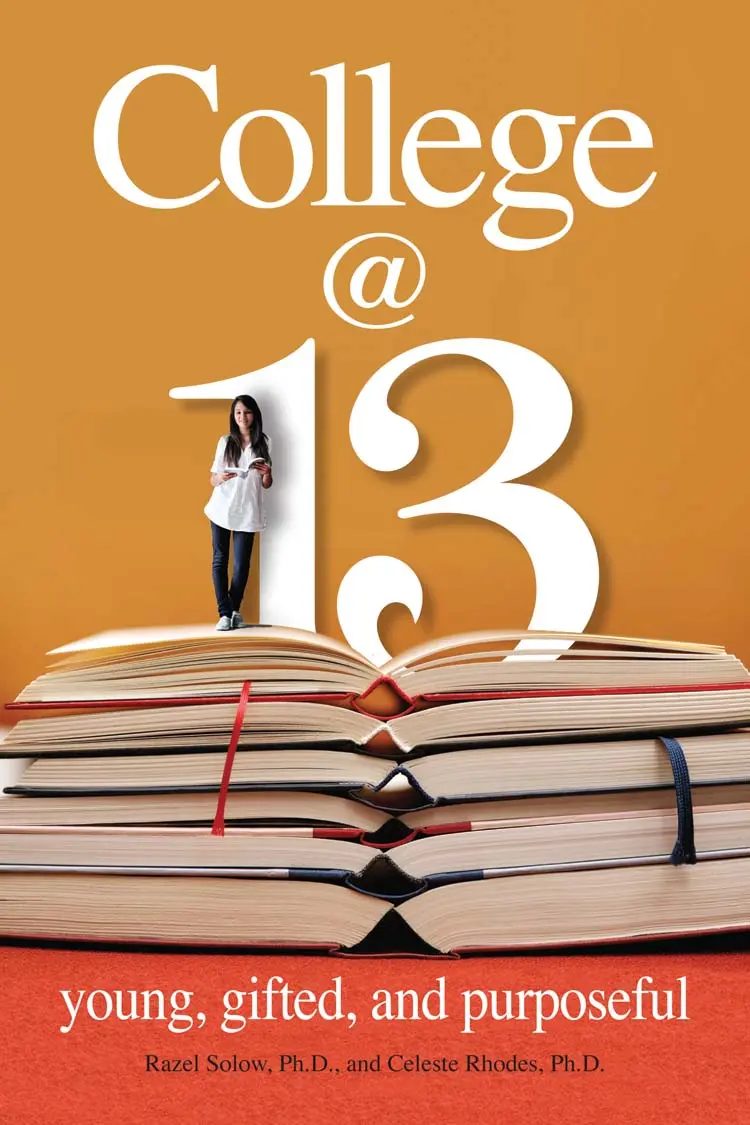By Kate Duey
Kate Duey is a private college counselor serving gifted students. She has worked with students on traditional schooling paths, home schooled students, community college students and students seeking accelerated or early college entrance. Kate is a graduate of Harvard College and Harvard Business School. She has a Certificate in College Counseling from UCLA.
 Razel Solow, Ph.D., and Celeste Rhodes, Ph.D., turn the chief criticism of early college entrance–that early entrance inhibits healthy social development–on its head in College at 13: Young, Gifted, and Purposeful (Great Potential Press, 2012). Their book is centered on a longitudinal study of fourteen women who entered Mary Baldwin College’s Program for the Exceptionally Gifted (PEG) between the ages of 13 and 16. Dr. Rhodes, who had been the Assistant, Associate and Executive Director of PEG, began the study supported by a grant from the Malone Family Foundation. When poor health precluded her from continuing her work, Dr. Rhodes invited Dr. Solow to finish the project. Dr. Solow is the former Director, Center for Gifted Studies and Education, at Hunter College.
Razel Solow, Ph.D., and Celeste Rhodes, Ph.D., turn the chief criticism of early college entrance–that early entrance inhibits healthy social development–on its head in College at 13: Young, Gifted, and Purposeful (Great Potential Press, 2012). Their book is centered on a longitudinal study of fourteen women who entered Mary Baldwin College’s Program for the Exceptionally Gifted (PEG) between the ages of 13 and 16. Dr. Rhodes, who had been the Assistant, Associate and Executive Director of PEG, began the study supported by a grant from the Malone Family Foundation. When poor health precluded her from continuing her work, Dr. Rhodes invited Dr. Solow to finish the project. Dr. Solow is the former Director, Center for Gifted Studies and Education, at Hunter College.
Rhodes and Solow’s case study materials stretch from birth into well-formed adult lives. Pseudonymously presented, the PEG graduates share their lives’ stories in detail. The reasons they entered PEG offer important insights into the life of a gifted girl in middle school. Many scholarly publications on the development of gifted children precede College at 13, but Rhodes and Solow stay away from normed studies. Instead, they stay with their subjects’ voices and let these fourteen women describe the world of giftedness. The women share stories of being isolated, confused, humiliated and slapped. The authors spare nothing.
Grounded in this detail, Solow and Rhodes make the case that socialization and social development ought not to be confused. Socialization, the art of joining a group, can be impossible if the group is fundamentally hostile. The middle school years, when students turn away from their families and toward their peers, present a painful choice: give up your passions, conform and be included; or not. Beyond fellow students, the girls’ teachers are a mixed bag, some supportive and some clearly annoyed. The consequences of socialization denied include social development inhibited. Echoing her fellow PEGs, Julia says, “Not caring about what everyone thinks is one thing, but feeling okay about being different is something else.”
Supportive parents are the heroes of the book, and Solow and Rhodes get to the parents’ stories straightaway. It takes a special kind of mother and father to move a thirteen-year-old daughter onto a college campus. Words describing home life with these parents include “peace,” “trust” and “seriousness”. Over and over, the parents talk about how they want their daughters to pursue the daughters’ dreams and interests. Comparing these students to a study of 81 class valedictorians in Illinois, Solow and Rhodes observe that there are important differences between parents who want their children to succeed and parents who want their children to grow. Identifying those parents, and the support they have given and likely will give, is crucial in making radical acceleration work.
And what happens twenty years or so later? These students have remarkably unremarkable lives. To be sure, most of them continue as students (eight MA/MS/MFA degree holders, and one in progress; one lawyer; one Ph.D. and one in progress; one MD in progress). But they don’t speak of isolation and feeling different, even when they are different. One young woman entered law school at eighteen and surprised her classmates when everyone went to a bar and she couldn’t order a drink. She was confident, they were respectful and the evening rolled on. Other alumnae describe the nuts and bolts of everyday life: putting a bed in an office because of fibromyalgia; struggling to come out to a father; and coping, simultaneously, with her desire to build a woodworking business and her promise to finish her parents’ kitchen remodeling. These details are small, sometimes humorous and very reassuring. Being denied normalcy in their mid-teens, these women are having mostly stable and mostly happy ordinary adult lives.
Two clear advantages of radical acceleration for women emerge. First, they have more time to complete their educations and build careers before they start families. The challenge for many women, especially working in professions which require lengthy educations and apprenticeships, is the point at which to divide a career between working flat out and working with flexibility once professional credentials are in place. Second, being younger at graduation means the women have “extra time as a bonus, not as a launching pad for another round of running ahead.” It struck me that these are not really bonus years, but transferred years. Skipping over high school moves years that can be destructive and esteem-busting into years better lived because the whole self is better formed. Social development is a lifelong affair.
College at 13’s shortcoming is that these are successful entrants and graduates of radical acceleration. Rhodes and Solow’s fourteen PEG alumnae are among twenty handpicked by Mary Baldwin’s administration. Did everyone’s story go so well? What about the students who dropped out of PEG or struggled with their youthfulness after graduation?
Solow and Rhodes do us all a favor by shining light on a subject that can arouse passions without understanding. We talk often about supporting the whole gifted child. What exactly does radical acceleration offer the whole gifted adult? Not every gifted child is a good candidate for radical acceleration. Not every gifted child is a good candidate for high school. College at 13 contributes to understanding the differences.
Have you read College at 13? Please let us know what you thought in the comment section below!

